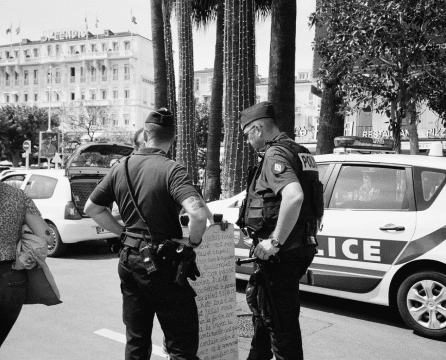Police Misconduct Lawsuit Settlements
Police brutality leads to injustice, serious injuries, and even death. Victims and their families can seek justice and monetary settlements through police misconduct lawsuits. The Police Brutality Center can connect you with lawyers who have experience with misconduct lawsuit settlements to evaluate your case.
Were you or a loved one a victim of police brutality?
Attorneys that work with Police Brutality Center may be able to assist you.
"*" indicates required fields
Content Last Updated: March 3, 2025
Police misconduct involves unethical and unlawful activities by law enforcement officials, including excessive force and unreasonable searches and seizures. Victims and their families can seek justice through police misconduct lawsuit settlements.
The Police Brutality Center offers resources and guidance for victims of police brutality and other law enforcement misconduct. We can connect you with experienced lawyers to evaluate your case and estimate your settlement amount.
What Is the Average Police Misconduct Lawsuit Settlement?
Determining the average police misconduct lawsuit settlement is complex due to the diversity of cases and the lack of standardized reporting across various jurisdictions. The types of police misconduct lawsuits include:
- Police brutality refers to a law enforcement officer’s unwarranted or excessive use of physical force. Such misconduct includes beatings, Taser use, and other violent acts against individuals. Police brutality incidents have led to a significant public outcry, particularly when racial profiling is involved.
- Excessive force occurs when a police officer uses physical force to an extent exceeding what is necessary. It can result in severe physical injury or death. In addition, incidents of excessive force erode the public’s trust in law enforcement. Determining what is excessive often depends on the situation. An example of this type of police misconduct was the recent beating death of Tyre Nichols in Memphis, Tennessee. Commonly excessive force results in shooting-related injuries or death as well.
- Sexual assault and harassment include unwanted sexual advances, verbal or physical conduct of a sexual nature, or requests for sexual favors by a law enforcement official. These severe violations of professional ethics and individual rights can give rise to legal action against the perpetrators.
- Unreasonable search and seizure occurs when the police search a person or their property without a valid reason, warrant, or consent, violating the Fourth Amendment. Such misconduct can exclude evidence in a criminal case and legal action against the offending officers.
Knowing the average settlement amounts for police misconduct lawsuits helps to illustrate the issue of police misconduct across the United States.
According to The Crime Report, lawsuits filed to settle allegations of misconduct by over 7,600 police officers nationwide have cost over $3.2 billion in the past 10 years. Misconduct claims resulted in over 40,000 payouts to resolve accusations of wrongdoing at 25 of the biggest law enforcement offices.
Most people only hear about settlements that are for millions of dollars. These cases usually settle without publicity, and payouts are significantly higher in some areas. However, the estimated median payment for police misconduct cases is $17,500.
Claims are filed against police officers and departments for many reasons. They range from illegal search and seizure to cases of police brutality that result in a fatality. Cases against officers with multiple claims typically pay out $10,000 more than claims against other officers.
Unlike most municipalities, Minneapolis, Minnesota, publicly reports data regarding payouts for police misconduct. Between 2006 and 2018, the biggest payouts in Minneapolis were approximately four and five million dollars. However, in 2019, the city paid out more than $20 million. In 2021, the sum rose to over $27 million, the highest year thus far. This increase was due to the highly publicized case of George Floyd.
In 2023, just under $10 million in payouts have been made over Minneapolis police misconduct. Unfortunately, other cities do not publish similar data, making it challenging to see how this city compares with others across the country.
Variations in Settlement Amounts
Police misconduct and civil rights lawsuit settlements vary widely, ranging from a few thousand dollars to tens of millions. The disparity in data reporting and lack of transparency contribute to the challenge of pinpointing an average settlement amount.
Factors Impacting Settlement Amounts
However, each case may be evaluated based on the circumstances involved. Several factors can impact the settlement amount a victim receives. Some of these factors include the following:
- Severity of misconduct: More egregious offenses, such as murder or sexual assault, tend to lead to higher settlements.
- Evidence and witness testimony: The strength of evidence and the credibility of witnesses play a crucial role in determining the outcome.
- Reputation of the involved officers: An officer’s history of police misconduct can influence the settlement.
- Jurisdictional practices: Local laws, regulations, and community attitudes can affect settlement negotiations.
- Legal representation: The quality and experience of legal counsel can significantly sway the settlement amount.
While some information, such as the Minneapolis data, gives insight into the settlement landscape, the lack of uniform reporting makes it difficult to calculate a precise average. This opacity in reporting hinders public awareness and impacts the pursuit of justice and accountability.
Who Pays for Police Misconduct Settlements?
The financial responsibility for police misconduct settlements generally falls on the city or municipality that employs the police officers. These settlements are often paid from taxpayer-funded budgets, particularly those funds earmarked for law enforcement or general municipal liability.
The realization that taxpayers ultimately bear the cost of police misconduct lawsuits has led to public debates and calls for reform, particularly in cities where such payouts have reached significant totals. Some have argued that officers must be held individually liable, or insurance policies should assume the financial burden.
Understanding who pays these settlements highlights the complex intersections between law enforcement, municipal governance, financial responsibility, and public accountability.

What Is the Largest Police Brutality Settlement?
The largest police brutality lawsuit settlement on record resulted from the case of Randy Cox. The city of New Haven, Connecticut, agreed to a $45 million settlement with Cox, who was left paralyzed following an arrest by New Haven police.
Cox was injured while being transported in a police van after being detained on weapons charges. The driver slammed the van’s brakes to avoid a collision, causing Cox to strike a metal partition with his head. Despite pleas for help, the police refused treatment and mocked him.
The settlement marked a significant and unprecedented resolution in the history of police misconduct cases and ignited conversations about the extent of police accountability and the need for systemic reform.
This milestone settlement underscores the urgent need for change within law enforcement practices and highlights the potential financial impact of failing to address issues of police brutality.
Other Notable Civil Rights Lawsuit Settlements
Several major settlements have captured national attention. Here are some of the most noteworthy:
Eric Garner in New York
Police officer Daniel Pantaleo confronted Eric Garner for allegedly selling untaxed cigarettes. The officer proceeded to put Garner—who was unarmed—in a chokehold, ultimately resulting in his death. His family filed a wrongful death claim and received a settlement of $5.9 million from the City of New York.
Kiley Swaine in Torrance
Swaine received a settlement of $750,000 after police painted a swastika on his 2004 Hyundai Elantra while impounded in 2020. While Swaine did not learn of the police’s involvement until two years after the incident, it still led to a settlement, and 15 officers were placed on leave.
Edward Bronstein in California
The California Highway Patrol arrested Eric Bronstein on suspicion of drunken driving in 2020. While being restrained for a blood test, he could not breathe and subsequently died. Seven highway patrol officers and a nurse were charged with involuntary manslaughter. Bronstein’s family recovered $24 million in a settlement.
Racial Injustice Protestors in New York
In the summer of 2020, 1,300 protesters filed a civil rights lawsuit against the New York police after being beaten or arrested during racial injustice demonstrations. Each of the plaintiffs received just under $10,000 in the settlement.
Christian Glass in Colorado
Glass’s family received $19 million in a settlement after a deputy killed him during a mental health crisis. Along with the settlement, Colorado and Clear Creek County implemented new policies to prevent similar situations.
Has the Cost of Police Brutality Impacted Police Reform?
The growing financial burden of police brutality settlements has influenced police reform in some jurisdictions. Cities facing significant settlement payouts are increasingly examining their policing practices and implementing reforms to mitigate future liabilities.
For example, after Chicago spent over $662 million on police misconduct since 2004, the city agreed to a consent decree to drive significant reforms.
Similarly, New York City’s commitment to reform emerged following costly settlements.
However, critics argue that the correlation between police lawsuit settlement costs and substantial reform is inconsistent, and changes are often slow and inadequate. The financial aspect is undoubtedly a factor, but it remains part of a broader and more complex picture of the challenges in achieving comprehensive police reform.

The Police Brutality Center Can Help You Seek Justice
Police misconduct lawsuit settlements shed light on a deeply troubling aspect of our legal system. The variation in settlements, notable cases, and the overall impact on police reform paint a complex picture.
If you have been affected by police brutality and misconduct, get legal help to protect your rights and pursue the compensation you deserve.

